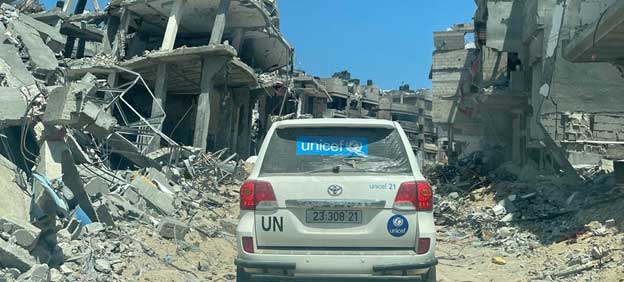
Pentagon and State Department Under Fire for Supporting Israel’s Actions in Gaza
Officials at the Pentagon and State Department have been working tirelessly for over 250 days, supporting Israel’s ongoing offensive in Gaza, which has resulted in significant civilian casualties. While these departments are supposed to focus on defense and diplomacy, they have instead been instrumental in implementing and concealing Washington’s war policies, which have claimed more lives than those of any other government in recent times.
The Controversy Over Cluster Munitions
Cluster munitions are particularly devastating weapons of war. Recognizing this, 67 Democrats and an equal number of Republicans in the House of Representatives voted last week to stop the US government from continuing to supply these weapons to foreign armies. However, more than twice as many House members voted against this measure, defeating a Pentagon funding amendment that would have banned the transfer of cluster munitions to other countries. As a result, the US can continue supplying these weapons to the military forces of Ukraine and Israel.
International Opposition and Civilian Impact
So far, 124 nations have signed a treaty banning cluster munitions due to their indiscriminate impact on civilians. The bomblets from these munitions are particularly dangerous to children because they resemble toys, as highlighted by the group Just Security.
Domestic Implications
Despite the international outcry, members of Congress do not have to worry about their own children encountering such bombs. The Biden administration initially responded to reports (later confirmed) of Russia using cluster munitions in Ukraine by condemning the act. On February 28, 2022, White House spokeswoman Jen Psaki stated that if the reports were true, it could potentially constitute a war crime.
At that time, the New York Times described cluster munitions as “internationally banned” weapons, which include rockets, bombs, missiles, and artillery shells that disperse lethal bomblets over a wide area, affecting both military and civilian targets indiscriminately.
Officials at the Pentagon and State Department have been working tirelessly for over 250 days, supporting Israel’s ongoing offensive in Gaza, which has resulted in significant civilian casualties. While these departments are supposed to focus on defense and diplomacy, they have instead been instrumental in implementing and concealing Washington’s war policies, which have claimed more lives than those of any other government in recent times.
The Controversy Over Cluster Munitions
Cluster munitions are particularly devastating weapons of war. Recognizing this, 67 Democrats and an equal number of Republicans in the House of Representatives voted last week to stop the US government from continuing to supply these weapons to foreign armies. However, more than twice as many House members voted against this measure, defeating a Pentagon funding amendment that would have banned the transfer of cluster munitions to other countries. As a result, the US can continue supplying these weapons to the military forces of Ukraine and Israel.
International Opposition and Civilian Implication
Ders voted oppositely. They defeated a Pentagon funding modification that may have banned the switch of cluster munitions to different international locations. The legislators assured that America could proceed with supplying these weapons to the army forces of Ukraine and Israel.
Up to now, 124 nations have signed a treaty banning cluster munitions, which regularly destroy the bodies of civilians. The “bomblets” of cluster munitions “are notably engaging to youngsters as a result of they appear like a bell with a ribbon bow on the finish,” explains the group Simply Safety.
However, no member of Congress ought to fear that one among his or her youngsters would possibly someday choose up such a bomb, maybe mistaking it for a toy, and be killed immediately or maimed by shrapnel.
The Biden administration responded accurately to indications (later confirmed correct) that Russia was utilizing cluster munitions in Ukraine. On February 28, 2022, White Home spokeswoman Jen Psaki informed reporters that if experiences of Russian use of such weapons turned out to be true, “it could doubtlessly be a battle crime.”
At the moment, the Quilt of New York Instances described “internationally banned cluster munitions” as “quite a lot of weapons (rockets, bombs, missiles, and artillery shells) that disperse deadly bombs within the air over a large space, hitting army and civilian targets alike.”
Days later, the Instances reported that NATO officers “accused Russia of utilizing cluster bombs in its invasion,” and the newspaper added that “antipersonnel cluster bombs. . . “killing so indiscriminately that worldwide regulation prohibits it.”
However, when the Ukrainian army ran out of ammunition last year, the US administration determined to start sending them cluster munitions.
“All international locations ought to condemn the usage of these weapons beneath any circumstances,” Human Rights Watch stated.
BBC correspondent John Simpson summed it up 1 / 4 of a century in the past: “Used towards human beings, cluster bombs are a number of the most savage weapons of contemporary warfare.”



